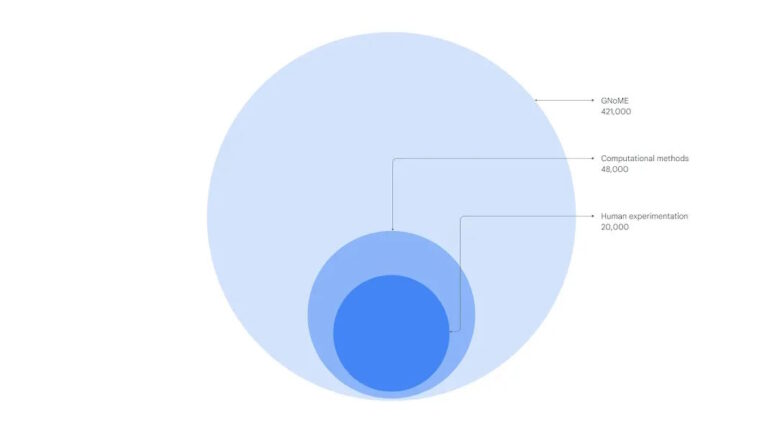Deepmind's GNoME AI tool speeds up crystal research by 800 years

Discovering new crystal structures is a tedious task for scientists. A new AI tool from Google Deepmind aims to accelerate the process.
Google Deepmind has published an article in Nature about its AI tool GNoME, which has discovered more than 2.2 million new crystals. According to Deepmind, these include some 380,000 particularly stable compounds that could potentially be used for future technologies such as superconductors, better batteries or new types of semiconductors.
Until now, the discovery of new inorganic crystals has often been a lengthy process. GNoME aims to accelerate this process dramatically by using graphene networks to suggest suitable candidates and predict their stability. This could lead to the discovery of more new materials in a short period of time than would otherwise have been discovered in 800 years.

"Active learning" with quantum physics
GNoME was first trained using publicly available data on the crystal structure and stability of known materials from the Materials Project. The performance of the system was then "dramatically boosted" through active learning: GNoME suggested new materials that were then tested for stability using quantum physical density functional theory.
These results were fed back into training, increasing GNoME's discovery rate for predicting material stability from around 50 percent to over 80 percent. Deepmind was also able to increase the efficiency of the model by improving the discovery rate from under 10% to over 80%, which they say "could have significant impact on how much compute is required per discovery."
Some of GNoME's predictions have already been confirmed experimentally: Other labs have already synthesized 736 of the predicted new crystals. The data from the 380,000 most stable candidates are now freely available to other researchers around the world to help them develop new technologies.
First crystals synthesized in a robotic lab
In a blog post, Google Deepmind points out that the development of new technologies based on these discoveries depends on the ability to produce them in the first place.
In an experimental robotics laboratory called A-Lab, researchers at Berkeley Lab have already successfully synthesized 41 new materials in an automated process within 17 days. The system independently selected the ingredients, performed the synthesis, and then analyzed them.
However, systems like GNoME could find more theoretical structures than even automated laboratories could produce. There would therefore be a real need for an AI that predicts which ones are worth synthesizing, the team writes.
AI News Without the Hype – Curated by Humans
As a THE DECODER subscriber, you get ad-free reading, our weekly AI newsletter, the exclusive "AI Radar" Frontier Report 6× per year, access to comments, and our complete archive.
Subscribe nowAI news without the hype
Curated by humans.
- Over 20 percent launch discount.
- Read without distractions – no Google ads.
- Access to comments and community discussions.
- Weekly AI newsletter.
- 6 times a year: “AI Radar” – deep dives on key AI topics.
- Up to 25 % off on KI Pro online events.
- Access to our full ten-year archive.
- Get the latest AI news from The Decoder.